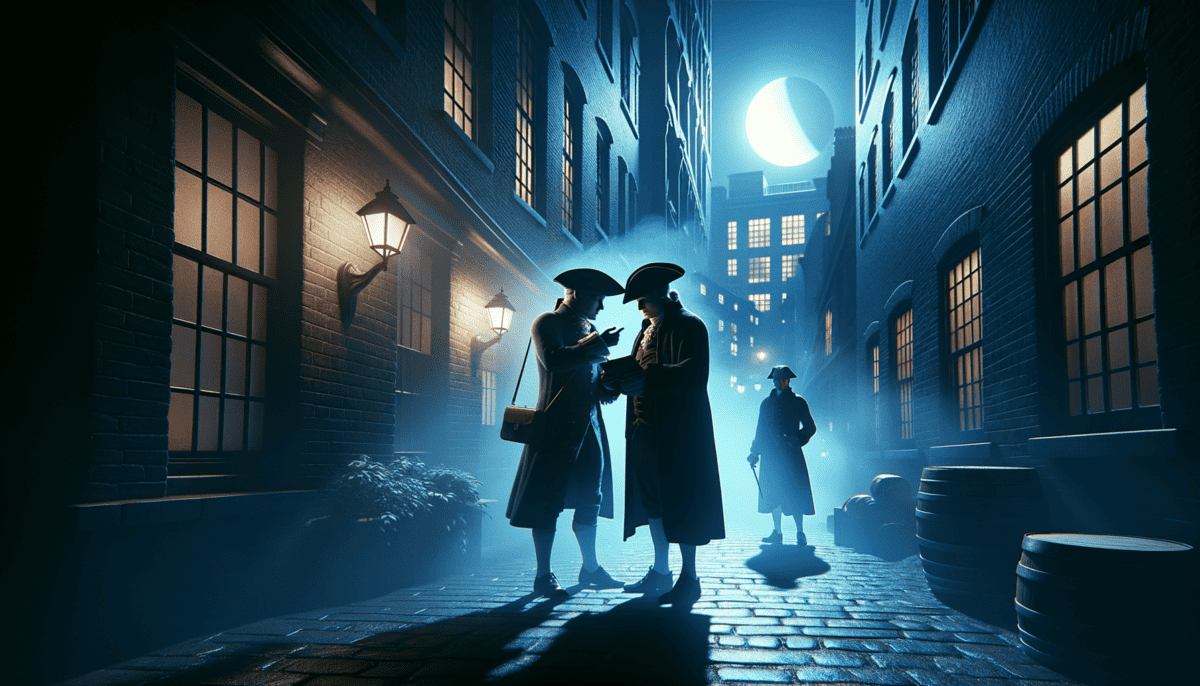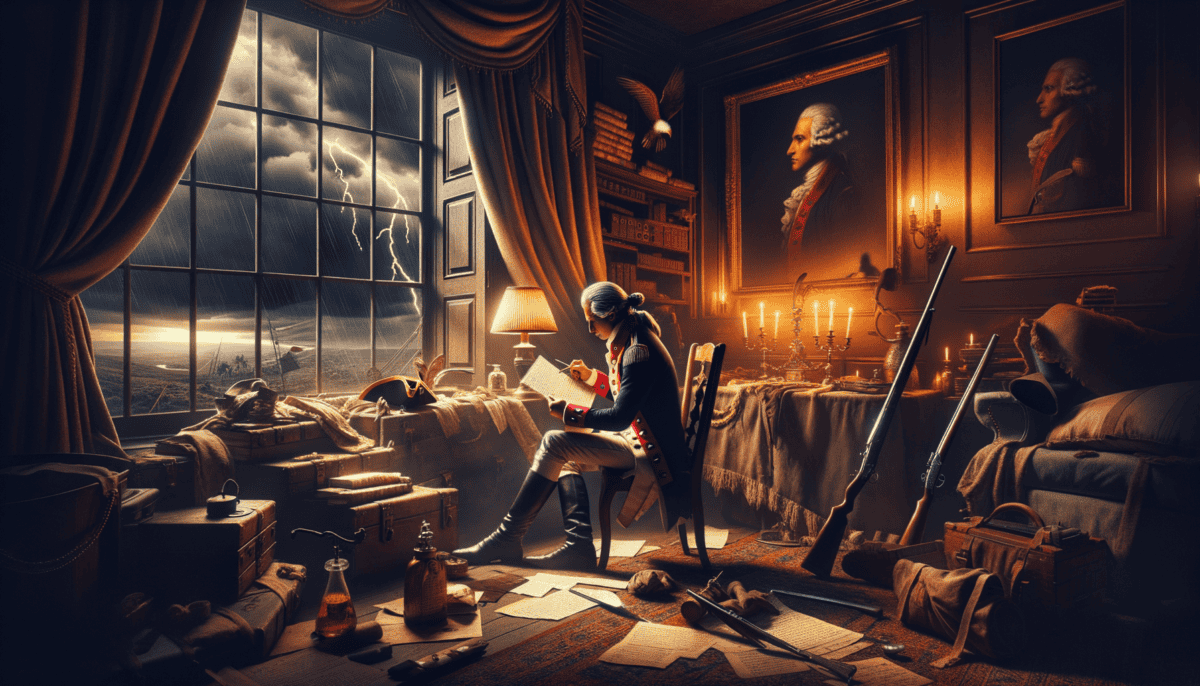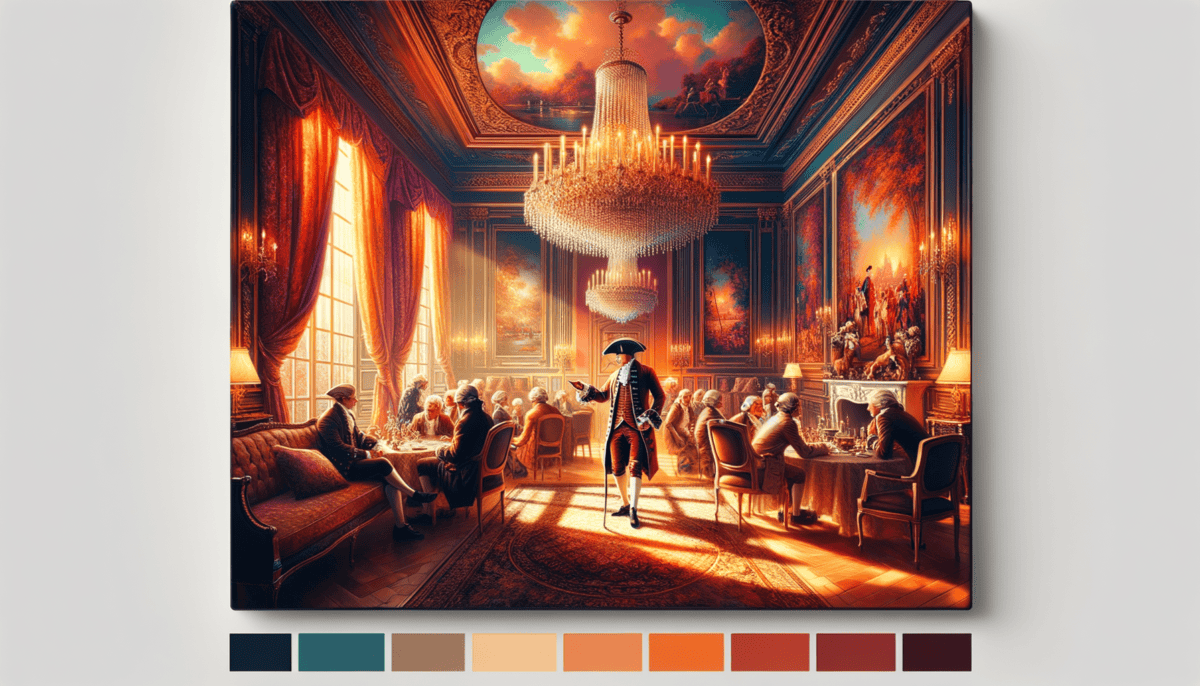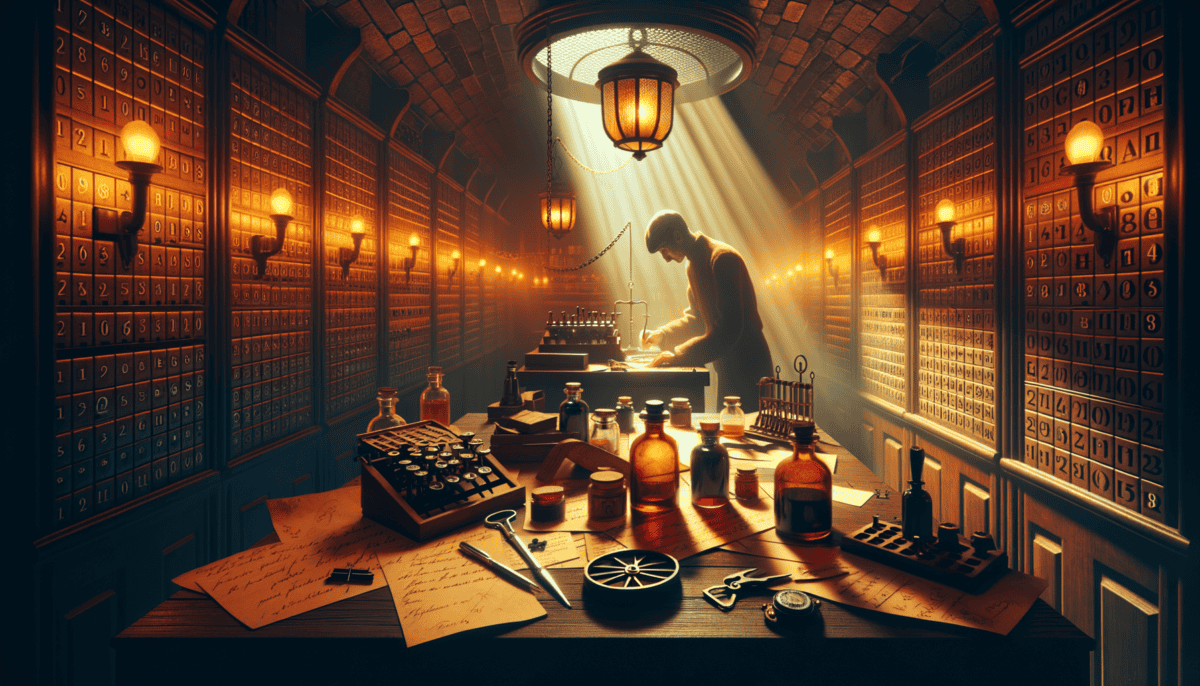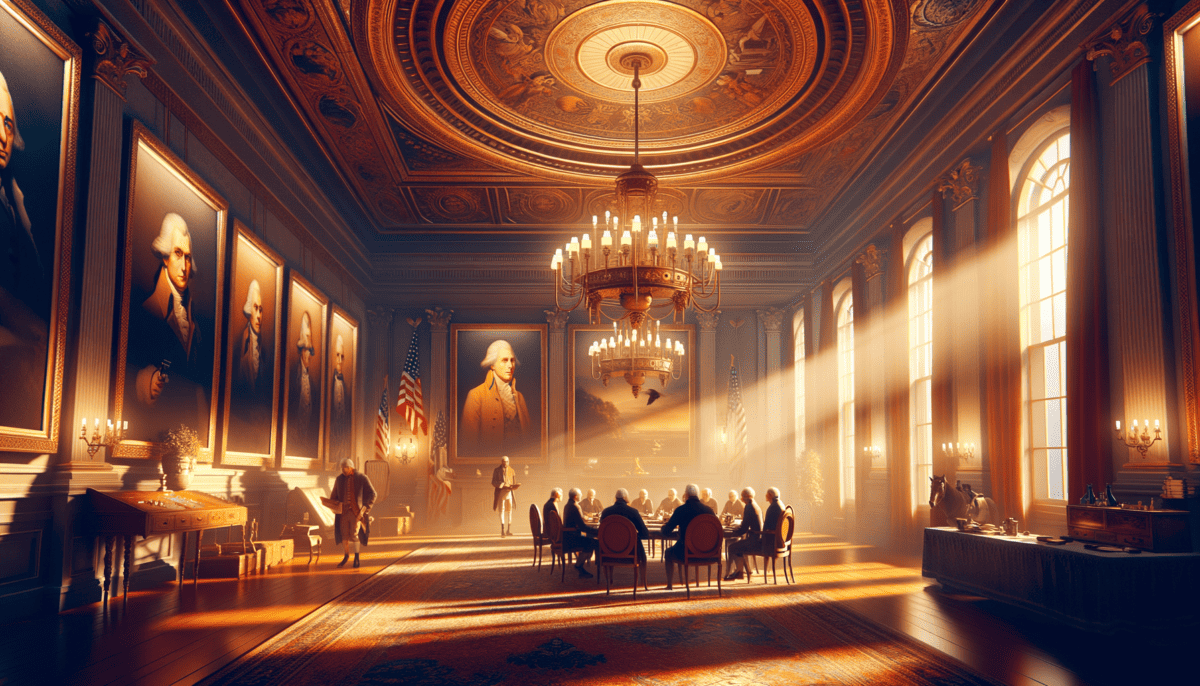Shadows of Rebellion
The year was 1775. The streets of Boston were not peaceful anymore. British soldiers in bright red coats marched everywhere. They watched the colonists closely.
Young Nathan Hale sat in his small classroom, teaching his students. But his mind was somewhere else. He knew things were changing. The British were making life hard for everyone.
"Teacher Hale, why are there so many soldiers?" asked little Mary, one of his students.
Nathan smiled kindly. "Sometimes, Mary, grown-ups disagree about important things. Right now, our people and the British king are having a big disagreement."
A Secret Meeting
Later that night, Nathan sneaked into a dark tavern. Other men were there too, whispering about freedom. They wanted America to be free from British rule.
"We need to know what the British are planning," said a man in the corner. "We need brave people to watch them and tell us their secrets."
Nathan felt his heart beat faster. He knew he could help. He was smart and brave.
Benjamin Franklin’s Secret Work
Meanwhile, in Philadelphia, Benjamin Franklin was doing important work too. He wrote letters to important people in other countries. He wanted them to help America fight for freedom.
"We must be very careful," Franklin told his friends. "The British have spies everywhere. They're reading our mail!"
So Franklin came up with clever tricks:
• Writing letters in special invisible ink
• Using fake names
• Sending messages in secret codes
The First Steps
Nathan started his secret spy work. He would:
- Watch the British soldiers
- Listen to their plans
- Write down what he learned
- Tell the American leaders
But being a spy was dangerous. If the British caught him, he would be in big trouble!
“Knowledge is power,” Benjamin Franklin always said. And now, more than ever, America needed both.
Young Mary noticed her teacher was acting different. "Teacher Hale, are you okay?" she asked one day.
Nathan patted her head. "Yes, Mary. I'm just doing something very important for our future."
The Storm Begins
More British ships arrived in Boston harbor. The colonists were getting angry. They didn't want to pay unfair taxes. They didn't want British soldiers in their homes.
Nathan wrote in his diary: "Things are changing. We must be brave. We must be smart. We must be ready."
One evening, as Nathan walked home, he saw British soldiers putting up new rules. The colonists couldn't meet in groups. They couldn't write what they wanted in newspapers.
Back in his classroom, Nathan looked at his students. He knew he was fighting for their future. He wanted them to grow up in a free country.
"Remember children," he said softly, "sometimes the bravest thing you can do is stand up for what's right."
The sun was setting over Boston harbor. Dark clouds were gathering. A storm was coming – not just in the sky, but in the hearts of the American people. The fight for freedom was about to begin, and secrets would play a big part in winning it.
The Secret Friends of Freedom
The summer of 1778 was hot in New York. Abraham Woodhull wiped sweat from his face as he picked vegetables from his farm. But farming wasn’t his only job. He had a bigger secret!
A Special Group Forms
General George Washington needed help. He wanted to know what the British army was doing in New York City. So he asked Major Benjamin Tallmadge to find special helpers.
“We need people the British won’t suspect,” said Washington. “Regular people who can watch and listen.”
Meet the Secret Friends
Abraham Woodhull looked like a simple farmer. But his code name was Samuel Culper! He would pretend to sell vegetables in the city. While there, he would watch the British soldiers.
Robert Townsend worked in a coffee shop. Many British officers came there to talk. Robert remembered everything they said. His code name was Culper Junior. ☕
“What did you hear today?” Abraham would ask when they met secretly.
“The British ships are getting ready to sail,” Robert would whisper back. “They’re planning something big!”
Clever Spy Tricks
- Used invisible ink that only showed up when heated
- Hung laundry in special ways to send signals
- Wrote messages in code numbers instead of words
- Hid letters in hollow buttons and fake eggs
“Sometimes the best spies are the ones nobody notices,” General Washington said with a smile.
Close Calls!
One day, a British soldier almost caught Abraham with a secret message!
“What’s that paper?” the soldier asked.
“Just a shopping list for my farm,” Abraham said calmly. The soldier believed him!
News for Washington
The Culper Ring told Washington many important things:
• Where British ships were going
• How many soldiers were in the city
• What the British were planning to do
This helped Washington make smart plans to win battles.
Regular Heroes
These regular people – farmers, shop owners, and friends – became secret heroes. They didn’t fight with swords or guns. They fought with their eyes, ears, and clever minds.
Anna Strong, who helped the group, would say: “Sometimes the bravest thing is to look ordinary while doing extraordinary things.”
As summer turned to fall, the Culper Ring kept working. They knew their secret work was helping America become free. Every whispered message, every coded letter, brought them closer to victory.
Their story shows that anyone can be a hero. You don’t need special powers or fancy uniforms. You just need to be brave and believe in what’s right!
The Hero Who Became a Traitor
General Benedict Arnold stood tall and proud. He was a brave soldier who had won many battles for America. But something dark was growing in his heart.
A Brave Beginning
Everyone loved General Arnold at first. He fought hard and led his soldiers well. In 1776, he even got hurt fighting for America! ️
“General Arnold is one of our best leaders,” George Washington would say with pride.
Things Start to Change
But Arnold started feeling angry. Other generals got more praise than him. Some people said mean things about him. His leg still hurt from his war injury.
“It’s not fair!” Arnold would say. “I do so much, but nobody thanks me!”
A Bad Choice
In 1780, Arnold made a terrible decision. He met secretly with British Major John André.
“I’ll help the British win if they pay me money,” Arnold whispered. “I’ll give them the plans to West Point fort.”
-
Why Arnold Turned Bad:
- He felt others didn’t respect him
- He wanted more money
- He was angry about being passed over for promotion
- His new wife liked the British better
The Plan Falls Apart
But Arnold’s plan didn’t work! American soldiers caught Major André with the secret papers.
“These papers are from General Arnold!” they told Washington. “He’s trying to help the British!”
Washington’s Sadness
George Washington felt very sad when he learned the truth. Arnold had been his friend.
“Whom can we trust now?” Washington asked quietly.
A New Life with the British
Arnold joined the British army. They gave him money, but nobody really trusted him. Even the British soldiers didn’t like having a traitor around.
“If he betrayed his own country,” they whispered, “how can we trust him?”
The Price of Betrayal
Arnold lived the rest of his life in England. He was rich, but he wasn’t happy. Americans never forgot what he did.
His name became a way to say someone was a traitor. Even today, people remember Benedict Arnold as the man who betrayed his friends and his country.
The story of Benedict Arnold teaches us something important: Being loyal and honest matters more than money or fame. True heroes stay true to what they believe in, even when things get hard.
While Arnold chose the wrong path, many other American heroes kept fighting for freedom. They showed that doing the right thing is always better than taking the easy way out.
Franklin’s Secret Mission in Paris
Benjamin Franklin walked through the fancy streets of Paris. He wore simple clothes, but his clever smile made everyone notice him. He had a super important job to do: get France to help America win its freedom!
A Special American in Paris
Franklin wasn’t like other fancy diplomats. He wore a plain brown coat and a fur cap. The French people loved it! They called him “Le Bonhomme Franklin” – the good old Franklin.
Making Friends in High Places
Franklin was super smart about making friends. He went to fancy parties and told funny stories. But he was always thinking about how to help America.
“America needs ships and guns,” Franklin would say to King Louis XVI’s helpers. “We can be great friends with France!”
Secret Meetings
Many meetings happened in secret. Franklin met with French leaders in quiet rooms and garden paths.
“If France helps America,” he would explain, “we can both win against England!”
“Monsieur Franklin is very wise,” the French ministers would say. “Perhaps we should listen to him.”
Playing a Clever Game
Franklin knew how to be patient. He didn’t rush or push too hard. Instead, he let the French come to him with questions.
-
Franklin’s Smart Ways:
- Being friendly to everyone
- Telling interesting stories
- Staying calm and patient
- Using science and wit to impress people
Good News at Last
In 1778, Franklin’s hard work paid off! France agreed to help America. They would send ships, soldiers, and money.
“This is a great day for America!” Franklin wrote to Congress. “With France’s help, we can win our freedom!”
More Than Just Help
Franklin didn’t just get France’s help. He made them really believe in America. He showed them that Americans were smart, brave, and worth helping.
“The Americans fight for freedom,” the French people would say. “Just like we believe in freedom too!”
A Famous American in France
By the time Franklin left Paris, he was a hero to both countries. The French loved him almost as much as Americans did!
“Franklin did more than just get help,” people said. “He made America and France become true friends.”
Franklin showed that sometimes the quietest victory can be the most important. His clever words and friendly smile did more good than any army. He proved that making friends can be just as powerful as fighting battles.
Secret Codes and Hidden Messages
The American Revolution wasn’t just about soldiers and battles. Some of the most important fighting happened with secret notes and clever tricks! ️♂️
The Invisible Warriors
“Quick, hide the message!” Sarah whispered to her brother. She wasn’t a soldier, but she was just as brave. She carried secret notes past British soldiers every day.
Magic Ink and Hidden Words
The spies used super cool tricks to hide their messages. They wrote with special invisible ink that only showed up when heated!
“Hold the paper near the fire,” James told his friend. “See? The words appear like magic!”
“The British will never find our secrets now!” his friend smiled.
Secret Code Names
Everyone who helped had a special code name. George Washington was “711.” Other spies had names like “Culper Jr.” and “John Bolton.”
Clever Tricks
-
Spy Tools and Tricks:
- Invisible ink made from lemon juice
- Secret codes and numbers
- Hidden pockets in clothes
- Messages inside hollow buttons
The Clothesline Code
Anna Strong was super smart. She hung her laundry in special ways to send messages. Different colored clothes meant different things!
“Look at the clothesline,” one spy would say. “A black petticoat means a message is ready!”
Important Information
These secret messages helped America win many times. They told Washington where the British ships were going and what the enemy was planning.
Brave Women Spies
Many women were amazing spies. They could go places men couldn’t. The British soldiers didn’t think ladies could be spies!
“The women are our secret weapon,” Washington said. “They are brave and clever.”
The Power of Information
Sometimes a simple message could be more powerful than a hundred soldiers. The spies helped America win by being smart, not just strong.
“Information is like gold,” Washington wrote. “It can win battles before they even start.”
The secret messages and brave spies showed that you don’t need to be big and strong to be a hero. Sometimes the quietest heroes make the biggest difference!
The Final Victory
In a cozy room in Paris, some very important people gathered around a big table. The year was 1783, and it was time to end the American Revolution!
The Secret Meeting
Benjamin Franklin sat in his favorite chair, smiling like someone who knew a really good secret. He had worked for years to make friends with France and get their help.
“Today, we make history,” Franklin said, adjusting his glasses. “Today, America becomes free!”
The Hidden Heroes
All around the room, people thought about the brave spies who helped win the war. Some were farmers, some were shop owners, and some were even kids!
“Remember the Culper Ring?” whispered John Adams to Franklin. “Without their secret messages, we might not be here today.”
Looking Back at Our Spies
-
Our Secret Heroes:
- The brave women who carried messages
- The smart men who wrote in invisible ink
- The clever kids who helped fool the British
- The friendly French people who helped America
A Happy Ending
George Washington was so happy when he got the news. America had won! All those secret messages and brave spies had helped make it happen.
The Big Thank You
“We must never forget our secret heroes,” Washington said. “They fought without guns but won with their minds.”
Many of the spies went back to their normal lives. They became farmers and shop owners again. But they knew they had helped make America free!
A New Beginning
America was now its own country, ready to grow and become strong. The brave spies had helped make a new nation where people could be free.
“Remember,” Franklin told the children later, “sometimes the quietest heroes make the biggest difference!”
America’s Secret Gift
The spies left us something special – they showed us that regular people can do amazing things. They proved that being clever and brave is sometimes better than being strong.
And so, America began its journey as a free country, thanks to soldiers, spies, and brave people who worked together to make their dream come true.


